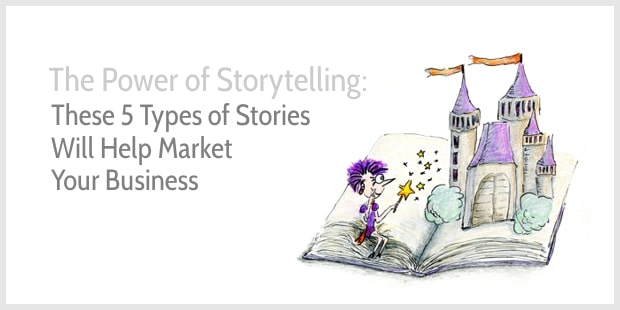 What would happen if marketers stopped thinking like marketers?
What would happen if marketers stopped thinking like marketers?
And what if they became storytellers instead?
Imagine that … marketing copy would become so engrossing that you wouldn’t notice what happened around you.
You’d read a blog post or sales page as if you were living the story—just like you’d be gripped by a good thriller or enthralled by a feel good novel.
You’d let your coffee go cold. You ignore your Facebook notifications. You don’t even hear your phone ringing.
Would it be possible?
Telling stories to help sell is not new
Legendary copywriter Joe Sugarman already suggested that readers should feel compelled to read your ad as if they’re sliding down a slippery slide.
To create this slippery slide, he often starts his copy with a story:
People love stories, and one of the really good ways to relate to your prospect is to tell a story. (…) a story can be invaluable and creates an emotional relationship of bond that keeps your prospect riveted and listening.
His choice of the word slippery is a tad unfortunate. We’re not using stories in a slippery or deceitful way. We’re using stories to captivate an audience and make an emotional connection.
We want to make readers imagine what it would be like to work with us or use our product. We want to make them feel part of a shared story, a shared experience.
But how?
Here are 5 types of stories that’ll help captivate your audience and market your business …
Type of story #1. Inspire with your business mission
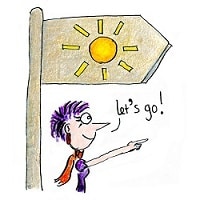 Let’s be honest …
Let’s be honest …
The web is full of gobbledygook-filled mission statements, conjured up by committees with the only aim not to offend anybody.
Big corporations can afford to be boring but for small businesses and freelancers, business life is different. We don’t have heaps of money, so we have to fascinate our audience and spark action.
Instead of a boring mission statement, tell a business founding story and take your readers on a journey, give them a glimpse of who you are.
Here’s how Tuft and Needle explain why they started selling mattresses:
JT had just gotten married and he and his wife set out to buy their first piece of furniture together—a new mattress. The search began at local mattress showrooms; vast fields of mattresses neatly laid out under the buzz of fluorescent lights. Pushy salesmen pushed them to buy a fully loaded, feature-rich memory foam mattress. For $3,300 it should have been the pinnacle of comfort, but it wasn’t. To make matters worse, the return policy rendered it impossible to return. It was like car shopping. Actually it was worse than car shopping.
A good founding story explains what problem you encountered and how you decided to fix it. Such a story is perfect for your About page. You can let your passion shine through your words and inspire readers to check out your products or services.
How to craft an inspirational story about your business mission
Type of story #2. Let people imagine working with you
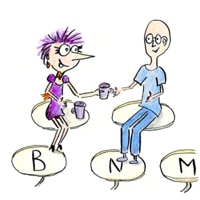 Research has shown that when people hold a product in their hands, their desire to own it increases.
Research has shown that when people hold a product in their hands, their desire to own it increases.
Online, you can’t get people to hold your products, but you can show enticing product images and you can let readers imagine using your product by telling a story.
Here’s an example of a story about a juice shot on the UK website of smoothie maker Innocent:
It’s amazing what you can fit into a small space when you really put in the effort. If you’ve ever tried rolling clothes instead of folding them, you’ll know what we mean. As it turns out, our crafty team of squeezers are even better at this than we thought they were. Armed with some sour cherries, raspberries, grapes and a few vitamins, they’ve managed to pack a lot of good stuff into a bottle that’s small enough to lose down the back of the sofa. Next time we’re packing for a two week camping trip in Dorset, we’ll know who to speak to.
Can you picture the amount of fruit and vitamins stuffed into that small bottle?
You can use the same techniques of visual imagery if you’re a service provider. For instance:
As your coach, I take you by the hand and together we tackle your biggest business challenges. Once per week, we drink a virtual cuppa together, perhaps with a slice of cake. You tell me what’s going on, and together we make a plan of action for the next week. With me on your team, running your business becomes less daunting, less stressful, and more joyful.
To write a story about your product or service, think about your favorite client. How can you let them imagine using your product or your service? Be as specific as possible and try to introduce sensory details because such details help readers experience your story, making your offer almost irresistible.
How to turn an ugly marketing pitch into a magical story
Type of story #3. Share client success stories
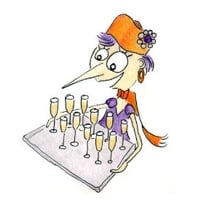 Who can tell the best stories about your business?
Who can tell the best stories about your business?
I’m sorry to say but it’s not you.
The best storytellers are your clients. When clients tell the stories of how you helped them solve a problem or achieve an aim, potential new customers can picture themselves experiencing the same transformation, too.
For instance, here’s the story of Jane Roberts, who joined my new copywriting course:
My background is in finance and numbers are my thing. In fact, I used to dread writing papers back in college. I remember telling people that I chose Accounting as my major because “I didn’t like to write.”
I’m only 37% through the Enchanting Copywriting course but holy cow – it’s amazing. At the risk of sounding dramatic, this course has already transformed my writing.
Admittedly, I didn’t realize that I would love the videos as much as I do. I thought to learn how to write from a course, you must read it.
I was wrong.
I watch the videos first then read the transcripts the next day to help me remember what I’ve learned. I’m enjoying the examples of what to do vs. what not to do and the fun illustrations.
I’m glad the videos are short and sweet because I’m able to stay focused and absorb the information like a sponge.
And I’ve already written 4 upcoming newsletters using the features/benefits and sunny destination tips taught in this course.
I’m starting to feel like a more confident, persuasive writer.
Most people resist asking their clients for testimonials. I find it hard, too, but I keep reminding myself that clients are my best sales people.
Type of story #4. Tell (made-up) stories to teach
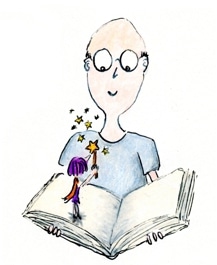 Are you writing a blog to share your expertise and grow your business?
Are you writing a blog to share your expertise and grow your business?
Stories on your blog help captivate potential customers, too. Stories make dry teaching more interesting, and perhaps more importantly, stories make your teaching stick as they help people remember what you’ve taught.
Stories on your blog can be real but you can make them up, too. For instance, here’s a story I made up to explain the difference between features and benefits:
Imagine you haven’t cycled for years, and you really don’t know much about bikes.
But you want to get fit again, and biking seems fun.
You go to your local bike store and tell the super-sporty-looking shop assistant you’re looking for a bicycle to tour around the area. Leisurely.
He tells you full of enthusiasm a hybrid would be ideal and shows you a few popular models. This one has 24 gears and it has cantilever brakes. That one has a Shimano drivetrain and disc brakes. And here’s a model currently on offer – it has an aluminum frame and hydraulic disc brakes.
Huh?
Instead of sharing boring lessons on your blog, include stories to captivate your audience.
Type of story #5. Share your personal lessons
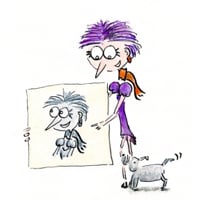 Large corporations often treat customers like a number, a subscriber on list, a lead that needs to be nurtured, the umpteenth complaint that has to be dealt with, the data that need to be mined.
Large corporations often treat customers like a number, a subscriber on list, a lead that needs to be nurtured, the umpteenth complaint that has to be dealt with, the data that need to be mined.
But many of us are looking for real human connections. We don’t want to be treated like a number.
As small business owners, we excel in being more human. This gives us a huge advantage over the big corporations. We can write about what really matters to us. We can pour our souls into our writing. We don’t have to stick to a script.
So, let’s share the stories that matter to us. Let’s be more human and write from the heart. It’s okay to share personal stories that don’t fit our brand. We’re not brands, we’re humans.
You know what’s my most commented post ever?
It’s last year’s post about ditching my gratitude journal. That post has nothing to do with writing but I wrote it to share my struggle of practicing gratitude.
The most human content helps connect. The best writing is personal.
So, step out of your comfort zone, and share a personal story.
Ignite your storytelling powers
When I started writing, I thought storytelling wasn’t for me.
I didn’t think I had the right talent, and storytelling seemed too difficult.
But I was wrong.
You don’t have to turn yourself into a Stephen King, a Toni Morrison, or a J.K. Rowling. You don’t have to be a novelist. You don’t need complicated plot structures.
Writing stories for your business is much simpler. Your stories can be short.
Think about the past week. What did you tell your friend who just phoned? What story did you email a colleague? What gossip did you share with a neighbor?
We are all storytellers. It’s part of being human.
So, share your stories on your website and captivate your audience.
Because stories help us to connect.
Happy storytelling!
Recommended reading on storytelling techniques:
8 storytelling techniques to captivate a business audience
9 Show don’t tell examples from inspirational storytelling
How to write a memorable story


Great article Henneke. Thanks for sharing.
Thank you, Myrna
You are so generous with your knowledge and ideas. Thank you for this.
You’re most welcome. I can only be this generous because a lot of readers buy my courses and books. I’m grateful they allow me to keep writing and sharing.
Thanks, Henneke for this great article. It’s fully loaded with great information and insights. It’s very helpful.
I’m glad you enjoyed it, Sieglinde. Thank you for stopping by. Happy storytelling!
Absolutely brilliant article Henneke. Can’t recall the last time I managed to read an entire blog post from top to bottom.
When I have time to properly write (sadly this has become rare), I was instinctively writing based on what you refer in ‘Story #2’ … so i feel like a winner right now ?
I like to also include a dash of ‘loss aversion’… Don’t miss out on the great benefits and results that we can bring for you or the product that you are looking at (depending on context). Or… Can you afford to waste marketing budget on campaigns that do not perform?…. something along those lines. What do you think of that?
Yes, you can do that. It’s about connecting with your reader’s desires and these can be formulated as what they’ll avoid or what they’ll win. It’s good to include both.
Thank you for stopping by, Jesmond. Happy storytelling!
Hi, Henneke. What a well explained content, and your writing style. I wish I could write like you someday.
I suck at storytelling, but reading through your write up gave me the hope to get better. You ignited the love for storytelling in me.
What steps should I take to get better?
Thanks.
The best way to learn is to read stories (especially the kind of stories you want to write) and try to understand how the stories are written so you can then try to use a similar approach.
You may also want check out this post on storytelling techniques: https://www.enchantingmarketing.com/storytelling-techniques/
Happy storytelling!
And she hits it outta the park again. Hi Henneke, I’ve just finished writing and posting my story about how I became a copywriter on my website blog, just a couple of days ago. I was hesitant to share it on LinkedIn because it is personal. I’m still not sure if LinkedIn is the right platform for it or not. What do you think?
I do think it fits on LinkedIn because even though it’s a personal story, it’s also about business. I’m not a big LinkedIn user but I’ve seen people doing well with business stories that are more personal (e.g., about personal challenges they encountered while setting up or running their business and how those challenges have led to changing business direction & business success). The key is often to share the problems encountered and the lessons you’ve learned from it so others can relate, learn something, and feel inspired.
Story is the way, for sure.
Even in counseling, if I can tell a story that illustrates how a principle works, the way becomes more clear and the counselee hears the hope behind the words.
It’s like the aroma coming from a kitchen, telling us what’s cooking, and when we are really hungry, all we want is to follow it. <3
The more I read from you about counseling, the more similarities I see with blogging.
I hope you’re staying safe and well, Katherine. <3
I am impressed with your the gift of writing that God has blessed you with.
I am searching for a copywriting course to pursue. How does your course compare to AWAI Accelerated writing for six figure income.
I haven’t taken the AWAI Accelerated Writing Program for a Six-Figure Income and haven’t heard direct feedback on it from someone who joined, so I can’t really comment on the details of the program and the teaching methods.
As the AWAI sales page suggests, the course teaches you how to write sales letters (or direct response letters)—these are the kind of letters that are mailed to people to sell stuff. The Enchanting Copywriting course focuses on writing sales pages for the web, whether that’s a product description, a service page, or a page to sell a course or book. This includes writing landing pages.
‘Who can tell the best stories about your business? I’m sorry to say but it’s not you’ ?
Yes! And I won’t even make an exception for you 🙂
Great article Henneke! I’ve been postponing my website’s new copy since ages and this shed a bit of light on where to begin, thank you!
Also, the gratitude post is one of my favourites.
I bet you have a lot of good stories to tell!
And good to see you again. I hope you’re staying safe and well. ♥️
I love this! Henneke, your posts are always so alive. It makes perfect sense to write a story using the words and scenarios your readers can relate to, rather than blurbing on to yourself so that nobody else can understand.
People have always loved stories from the mists of time, as well as a good bit of gossip! Adapting your blog posts into gossipy narratives is what influencers do. And it is influencers who are successful and have such large audiences. (Yet I suspect they do this naturally without much thought.)
Thank you so much for you lovely compliment, Alice. I love that you feel my posts are so alive.
Happy storytelling!
This is a perfect solution for me. Thank you.
Because you don’t like marketing either?
Because I am not very good at telling stories.
You’re probably a lot better at telling stories than you think.
I used to think I wasn’t good at telling stories. I thought one needed a special storytelling talent but I’ve found that for me the most difficult part was mustering the courage to start telling stories.
I hope this blog post (and the links to other articles) helps!
Brilliant!
Thank you, Shirley. Happy storytelling!
I hope you’re staying safe and well. ♥️
You’ve done another masterful job Henneke.
The story and the telling are definitely key to any good piece of writing.
And your links to further reading are such a bonus!
Thank you for all the work you do putting these posts together.
Stay safe.
I was a little surprised myself how much I’ve written about storytelling already.
Thank you for your lovely comment, Barry. I hope you’re staying safe, too. Take care. ♥️
Always good. Thanks.
Thank you, Anita. Always good to see you. I hope you’re keeping safe and well.?
“No S**T there I was!”
“And what I was facing when I looked up from the task at hand. Just across the pristine Idaho trout stream. Not 10 feet away. Scared the piss outta me.
Literally.”
I think that “slippery slope” sounds a little too “greasy,” bordering on a yucky “sleazy” Leisure suit Larry used car salesman spiel.
I prefer the idea of a Golden Thread woven throughout a story. Based on a Big Idea that helps the reader solve a problem with your product or service.
Thanks for a great post.
And thanks again for your “A Pain Free Process for Writing Your ‘About’ Page,” PDF guide.
Pure gold.
I refer back it to as I, hopefully, improve my own About Me page. An ongoing process based on feedback.
I hope this message finds you well.
Phil LeMaster,
Fraser, CO
I’m glad you think the same about the slippery slope. I was wondering whether I was getting hyper-critical here because otherwise I’m a big admirer of Joseph Sugarman.
I was also thinking about golden threads and weaving stories, and how all the tiny stories we tell together are woven into a rich carpet that reveal our true colors. But that all felt a bit too complicated to add.
I hope you’re staying safe and well, too.
I´m studying to be a blogger. My field is business. I´ve already written some articles but not published yet. You are my inspiration. Despite I´m from Brazil and my English is poor, I always read your posts and learn a lot from them. Thank you for your inspiration and knowledge.
Thank you so much, Orlando. That’s a lovely compliment.
I hope you’ll find the courage to start publishing your articles soon!
Another amazing post as always. Thank you Henneke.
Thank you, Marwa. Happy storytelling!
I need to improve my story telling. Another skill I need to learn. Thanks for sharing.
You can find a lot more tips and examples when you click through for “further reading” at the end of each story type.
Happy storytelling!
Hi Henneke,
This was valuable and I specifically loved Jane’s testimonial. That’s a real testimonial and anyone else wouldn’t hesitate featuring it.
I’ll have to save this to pocket for future reference. Thanks, Henneke.
Denzil
I love that testimonial from Jane, too. Such a powerful story!
Thank you for stopping by, Denzil. I appreciate it 🙂
It was powerful indeed. I can’t wait to read your next post.
Hi Henneke,
How have you been in this weird time we’re in? What a great approach to storytelling you have shown us here! Thanks for this.
Yes, it’s such a weird time. I feel lucky that I’m able to stay safe, working from home. But sometimes it all just gets to me, and I have to keep reminding myself that this too shall pass.
I hope you’re keeping safe and well, too?
Thank you for stopping by, Lee. I appreciate it. ?
Greeting Henneke,
Thanks for the amazing piece- already feeling like a storyteller.
I loved the example of the smoothie maker. It’s catchy, enchanting and hooks the readers the readers till the end.
Quick question, Henneke.
How long should a story be? 100? 150? 200 words? Something that the reader will enjoy to read without getting bored and heading to read the next article?
Off to tweet it.
Best,
Antony
I’ve told stories in blog posts that were between 100 and 150 words. The same is true for most of the client stories on my sales pages (I’ve not actually counted their words and some might be longer).
But I’ve also turned whole blog posts into one story so you’d be looking at a story of around 1000 words.
I don’t think there’s a rule for how long a story should be. I try to include enough details to make them vivid but not so many details that the pace becomes too slow. It’s always a balance.